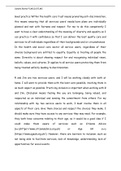Sandra Byrne P1,M1,D1,P2,M2
Good practice Within the health care trust means promoting anti-discrimination,
this means ensuring that all services users’ needs/care plans are individually
planned and met with fairness and respect. For me to do this competently I
want to have a clear understanding of the meaning of diversity and equality so I
can practice it with confidence so that I can deliver the best quality care and
services to all individuals regardless of their backgrounds and or circumstances.
In the health and social care sector all service users, regardless of their
diverse background are entitled to equality. Equality is treating all people the
same. Diversity is about showing respect for and recognising individual views,
beliefs, values, and cultures. It applies to all service users protecting them from
being treated unfairly leading to discrimination.
R and Jim are two services users, and I will be working closely with both at
home. I will want to provide them with the best care possible, involving them in
as much aspect as possible. Practicing inclusion is important when working with R
and Jim, (Inclusion means feeling like you are belonging, being valued, and
respected as an individual and sensing the commitment from others. For my
relationship with my two service users to work, I must involve them in all
aspects of their care. Give them choices and respect the choices they make. I
should make sure they have access to any services they may need. For example,
they both have concerns relating to their age, so it would be a good idea if I
could make them aware of services such as Citizens Advice
[Ref1](https://www.citizensadvice.org.uk) or Age UK [Ref2]
(https://www.ageuk.org.uk/). However, there are barriers to inclusion, such as
not being able to facilitate services, lack of knowledge, understanding, lack of
opportunities for social events.




